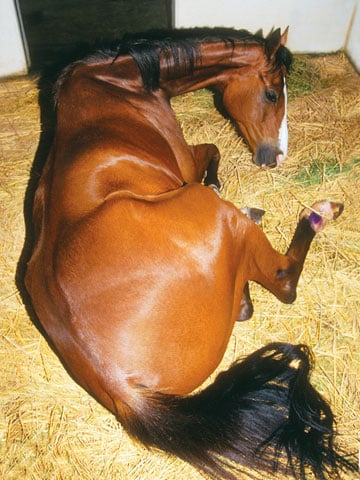The leading cause of death in horses is colic. Colic is defined as abdominal pain and is a symptom, not a diagnosis. (Walker) Some causes of this would be improper care, diet, and management practices, but it can be prevented. Colic can be treated if the symptoms aren’t avoided, otherwise can be fatal.
improper care, diet, and management practices, but it can be prevented. Colic can be treated if the symptoms aren’t avoided, otherwise can be fatal.
There are so many things that can cause colic, because of this one should know what causes it and also knows the symptoms. That way it can be stopped from happening in the first place and from letting it get worse and possibly becoming fatal. Some causes of colic would be: Irregular feeding, moldy feed, imbalance of grains and forage, can be very bad. Too little or too much water given is bad, should be consistent. Over exhausting and or over training a horse can also cause colic. (Keen) Other causes would be high amounts of stress and dental issues. Some signs a horse can have colic would be pawing, rolling, bloating, distress, the absence of gut sounds, loss of interest in food and water, and unnatural postures (sitting, stretching, etc.). (My Horse)
Not properly caring for a horse can result in death. This is why knowing the causes and symptoms are crucial to preventing colic in horses. The horse owner and or barn manager has a job to prevent colic by knowing how to care for a horse correctly. Feed, water, the stable, and where the horse eats and drinks, should be cleaned and be maintained as best as one can, that way mold or bacteria does not form in the environment. (The Equine) Never give feed directly on the ground because of possible sand consumption which causes sand colic. Feed should not be drastically changed in a short amount of time, instead should slowly incorporate new feed in with the old to accustom their digestive system. (My Horse) It is proven that a horse is 70% more at risk of colic when grain is the main feed given compared to a hay based diet. (Malone) There has to be a balance in everything that is done whether it is diet, exercise, and environment exposed to a horse.
Treatment should be the last resort since proper care of the horse should have been done to prevent the start of the illness. If it is too late and the horse is already showing symptoms, then calling a veterinarian would be the next action to be taken. In order to give treatment for colic, first, the cause must me identified that way the kind of treatment given is the correct one. (My Horse) There are cases where it can be easily treated with medication, but in other circumstances severe or advanced colic means immediate surgery is required if it is not too late. Although some horses cannot be saved because the symptoms are not taken seriously and are being neglected. Which means it can be too aggressive and painful and euthanizing is the only moral thing to do to stop the horse from further suffering.
Basic care and knowledge of horses is important in order to prevent something that can be minor but potentially become harmful or even deadly. The main issue that causes colic would be the type of care and attention that a horse is given. If the environment in which a horse resides is uncleanly or unorganized then the health of a horse is not guaranteed. Therefore, proper management of a horse is important to prevent colic. Also knowing the causes and symptoms of colic could be very helpful in stopping colic from ever occurring or from further progression of the symptoms.
Works Cited Page
- Walker, Bonnie Rae. “The Big Four: The Most Common Causes of Equine Fatalities.” Dressage Different. N.P., 18 Nov. 2013. Web. 25 Sept. 2016.
- The Equine Research Centre. “Equusite.com – Colic in Horses – Colic Facts.” Colic in Horses – Colic Facts. N.P., N.D. Web. 25 Sept. 2016.
- Keen, Karen, and Laura Coates-Markle. PDF. Computer software. Preventing and Treating Colic in Your Horse. Oregon State University, the U.S. Department of Agriculture, and Oregon Counties, Apr. 1996. Web. 25 Sept. 2016.
- “My Horse University.” Did You Know? Michigan State University Board of Trustees, N.D. Web. 26 Sept. 2016.
- “PetMD, LLC.” Colic in Horses. N.p., n.d. Web. 28 Sept. 2016
- “Colic Surgery: What Are the Chances of Success? – Horsetalk.co.nz.” Horsetalkconz. N.P., 18 June 2014. Web. 30 Sept. 2016.
- Malone, Erin. “Preventing and Treating Colic.” Horse: University of Minnesota Extension. N.P., N.D. Web. 30 Sept. 2016.

This is a decent essay, but it doesn’t address what colic actually is or the root causes of it. In it’s simplest form, colic occurs when part of the digestive track twists. When this occurs, it causes severe pain to the horse and causes digestion to stop completely. Given enough time, tissue death will occur as blood flow is cut off. Often, it’s the intestines or cecum that twist. Colic can occur when a horse does not get sufficient volumes of food to properly fill and empty the cecum or when they have a diet too rich in starches or a rapid change in diet resulting in overproduction of gases in the gut and stomach. It should also be noted that a diet too rich in starches can cause the stomach to burst. Horses have a very strong, tightly sealed esophageal sphincter which enters the stomach at an oblique angle, which means that they cannot belch to expel excess gases from the stomach. Too much gas build up can cause the stomach to burst. This condition is very often fatal.